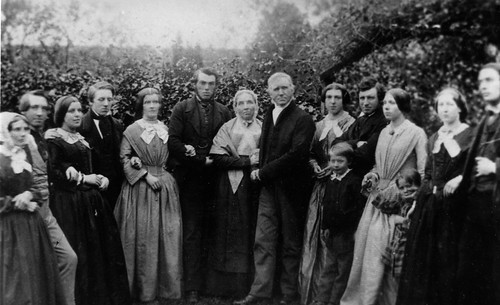My great great great uncle John Bayliff Bowman lived at Summer Hill, near Monyash in the County of Derby.
The
Bowman family, who were Quakers, had three
farms, One Ash Grange [which John Bayliff
Bowman often referred to as O.A.], Cales and
Summer Hill [which he usually referred to as S.Hill or
S.H.]
In this photo John is fourth from the left. My great great grandparents, Ebenezer and Hannah Bowman, are the third and fourth adults from the right. John and Ebenezer were brothers and their parents are the elderly couple in the middle, Henry and Mary Bowman.

In this photo John is fourth from the left. My great great grandparents, Ebenezer and Hannah Bowman, are the third and fourth adults from the right. John and Ebenezer were brothers and their parents are the elderly couple in the middle, Henry and Mary Bowman.

"A Farm Journal"continues :~
1 of 10 Mo[nth] Fine finish[e]d corn cutting dipped ewes & lambs
4 day 2nd Fair morn[in]g wet aft[ernoo]n - self to Ashford last night & on to Furnace M[onthly] M[eeting]* with Father & co[usin] E. this morn[in]g then to Peter Bramley's to tea & by train to Nott[ingha]m evening - our folks lead corn out of Watricle etc.
5 - 3 Fine day at Nott[ingha]m
6 - 4 Fine but cold & windy home with W[illia]m & two of Wain's [sic] children lead[in]g corn - Edw[ar]d Brewer had a Public Meet[in]g in even[in]g here to lodge to Bakewell in morning
7 - 5 Beautiful day W[illia]m & Eben[ezer]'s men & horses helping us to lead Nether Intake corn just finish[e]d at night
1 - 6 Fine
2 - 7 Very showery day Thunder & Lightning even[in]g
3 - 8 Ditto cold & showery thatch[in]g stacks & paring Watricle - only make 1 cheese a day at S.H. 14 cows - at Cales 2 1 day 1 the other - Very showery weather
up to 6 day 24 finish[e]d lead[in]g corn at S.H. in only mid[dlin]g condition
7 - 25 Fine getting potatoes Pewet Knobs self grind[in]g at Cales plough[in]g N[ethe]r Intake began last 2nd day to give cows a few turnips Showery weather
to 30th [next two words indecipherable !] Haven Fair day Fine day no cattle a great many sheep & prices low - bo[ugh]t 12 Ewes & 8 Thieves of G. Shirley 33/- each many unsold
* There is a photograph of the Toadhole Furnace Meeting House on the Crich Parish site ...
* There is a photograph of the Toadhole Furnace Meeting House on the Crich Parish site ...

'Bought 12 Ewes & 6 Thieves'. I'm assuming a 'thieve' is another word for 'ram'?
ReplyDeleteSorry, that should be 8, not 6.
DeleteAccording to Wikipedia Mitch :~ "Theave or theaf (plural of either: theaves) – a young female sheep, usually before her first lamb (used especially in lowland England). Also gimmer."
DeleteI was looking up 'thieve' when I should have looked up 'theave'. John Bayliff Bowman definitely spelt it with an 'i' rather than an 'a' !
'paring Watricle' makes no sense to me, so can you interpret?
ReplyDelete'Watricle' is a field and 'paring' is defined by the Domestic Encyclopedia at http://chestofbooks.com/reference/The-Domestic-Encyclopaedia-Vol3/Paring.html#.UNRXTazDUm4 as follows :
Delete"Paring
Paring of Land, an ancient practice in agriculture; but which, has, within a few years, been exploded in various parts of Britain. It consists in cutting off old turf at such a thickness as the labourer can conveniently effect; together with the more recent turf, at such a depth as will render it sufficiently dry for burning.- See p. 396-7 of our first volume.
Paring is chiefly practised on breaking up land from a state of nature; though it is with advan tage employed periodically, on cultivated ground. An instance of this fact occurs in the 24th vol. of Annals of Agriculture, where the industrious Mr. Boys states, that several acres of wheat, barley, oats, and sainfoin, were at that time growing on a soil, which had been repeatedly pared and burnt. He adds, that the crops were of sufficient value to buy the land at more than forty years purchase, at a rent fairly computed before the improvement. Hence it appears, that such practice, in the hands of judicious farmers, is excellent : and Mr. Middleton observes, in the 12th volume of the same work, that it almost invariably secures a large, first crop of turnips ; which (when fed upon land well stored with ashes) are the best preparation for subsequent crops ; and that there are very few (if any) pases, in which, with proper management, paring has not perfectly succeeded.
Read more: http://chestofbooks.com/reference/The-Domestic-Encyclopaedia-Vol3/Paring.html#.UNRXTazDUm4#ixzz2FgnvnsnN"